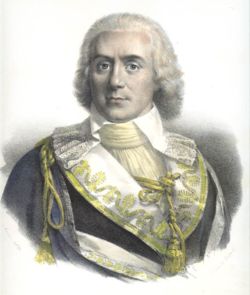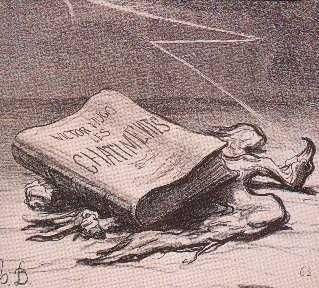There is nothing the Amateur Historian likes more than a scathing review of a ridiculous novel and, though the British Romantics had some doozies, the prize for scathing reviews must go to Mark Twain, for outlining
Fenimore Cooper's Literary Offenses, which, alas, were great indeed.
Fenimore Cooper was at the forefront of American Romanticism, whose variation on the return to nature and the exploration of the history of one's nation was an exploration (with varying degrees of success) of colonial days, where one could give blankets full of smallpox to natives so one could build oneself a little Roussean paradise in the now vacant backwoods. Cooper's adventure stories were extremely popular, but, in Mark Twain's opinion, an insult to the reader, to the Native Americans, to literature, to Romanticism, and to the English language itself.
Here are some particular gems:
- [The rules governing literary fiction] require that the personages in a tale shall be alive, except in the case of corpses, and that always the reader shall be able to tell the corpses from the others. But this detail has often been overlooked in the
Deerslayer tale.
- [The rules also] require that crass stupidities shall not be played upon the reader as "the craft of the woodsman, the delicate art of the forest," by either the author or the people in the tale. But this rule is persistently violated in the
Deerslayer tale.
-Cooper's gift in the way of invention was not a rich endowment; but such as it was he liked to work it, he was pleased with the effects, and indeed he did some quite sweet things with it. In his little box of stage-properties he kept six or eight cunning devices, tricks, artifices for his savages and woodsmen to deceive and circumvent each other with... He prized his broken twig above all the rest of his effects, and worked it the hardest. It is a restful chapter in any book of his when somebody doesn't step on a dry twig and alarm all the reds and whites for two hundred yards around. Every time a Cooper person is in peril, and absolute silence is worth four dollars a minute, he is sure to step on a dry twig. There may be a hundred other handier things to step on, but that wouldn't satisfy Cooper. Cooper requires him to turn out and find a dry twig; and if he can't do it, go and borrow one. In fact, the Leatherstocking Series ought to have been called the Broken Twig Series.
-In the matter of intellect, the difference between a Cooper Indian and the Indian that stands in front of the cigar-shop is not spacious.
-To believe that such talk really ever came out of people's mouths would be to believe that there was a time when time was of no value to a person who thought he had something to say; when it was the custom to spread a two-minute remark out to ten; when a man's mouth was a rolling-mill, and busied itself all day long in turning four-foot pigs of thought into thirty-foot bars of conversational railroad iron by attenuation; when subjects were seldom faithfully stuck to, but the talk wandered all around and arrived nowhere; when conversations consisted mainly of irrelevancies, with here and there a relevancy, a relevancy with an embarrassed look, as not being able to explain how it got there.
-There have been daring people in the world who claimed that Cooper could write English, but they are all dead now.
-. Now I feel sure, deep down in my heart, that Cooper wrote about the poorest English that exists in our language, and that the English of
Deerslayer is the very worst that even Cooper ever wrote.
- I may be mistaken, but it does seem to me that
Deerslayer is not a work of art in any sense; it does seem to me that it is destitute of every detail that goes to the making of a work of art; in truth, it seems to me that
Deerslayer is just simply a literary
delirium tremens.
One can read the review
here.







